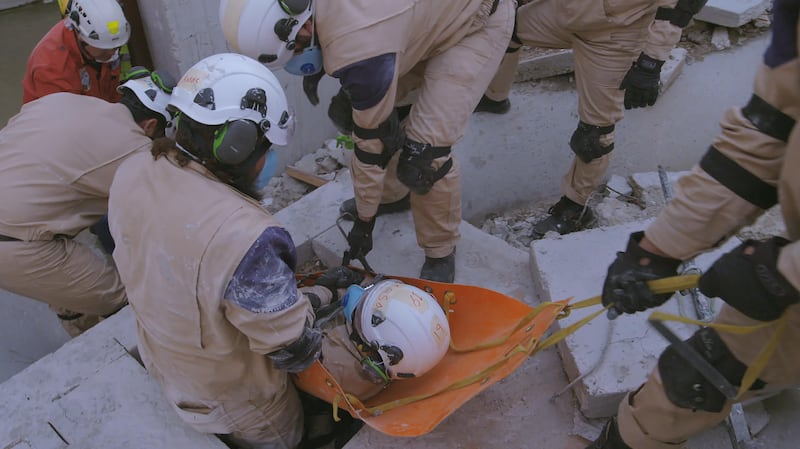Netflix is still to produce its first entirely original show in the region, but there are plenty of viewing options with a local link for those who take the time to search.
Ironically, compared to the United States' site, there are significantly fewer Middle East-themed shows available to UAE subscribers, in part due to licensing issues with existing regional distributors, and because many are yet been scheduled for the region; this means that some classics such as the Oscar winner Omar and Sundance and Emmy award-winning Five Broken Cameras are unavailable to watch here. Nonetheless, if you're eager to keep things local, here's our pick of some of the best Middle East-related content on the platform.
Salam Neighbour
2016 film Salam Neighbour documents the experiences of American filmmakers Zach Ingrasci and Chris Temple when they lived among 85,000 Syrian refugees in Jordan's huge Za'atari refugee camp, which lies just seven miles from the Syrian border. The filmmakers, who are believed to be the first allowed by the UN to register and set-up a tent inside a refugee camp, spent a month in Za'atari to cover what the UN Refugee Agency calls "the world's most pressing humanitarian crisis".
Sand Storm
This drama follows the day-to-day tribulations of a Bedouin family that is feeling the tension between conservative traditions and the rapidly evolving modern world. Daughter Layla is allowed to have a mobile phone and driving lessons, but a boyfriend is a step too far for father Suliman, who has an arranged marriage planned for her. Meanwhile, Layla’s mother Jalila is harbouring a simmering resentment for her husband’s newly arrived second wife. Essentially melodrama with a feminist undercurrent - don’t expect a happy ending. The film picked up the Grand Jury Prize at 2016’s Sundance Film Festival.
War Machine
David Michôd's Brad Pitt-starring, Abu Dhabi and Ras Al Khaimah-shot Afghan War satire surely needs little introduction to regular readers. The cast and crew spent more than a month shooting here in late 2015, and made use of well over 2,000 locally-recruited extras. The film finally landed on Netflix in May, and if you haven't watched it yet, you should. Admittedly, there are no Furious 7-style lingering shots of Abu Dhabi's most famous landmarks, but there's plenty of dark humour and a depressingly accurate critique of quite how pointless and ill-judged the never-ending Afghan conflict appears to be.
Zinzana
The first UAE-produced movie to be picked up by Netflix, which is at least a start until it produces some of its own. Zinzana was directed by Image Nation Abu Dhabi stalwart Majid Al Ansari and starred another regular on the local movie scene, Palestinian actor Ali Suleiman, also of Lone Survivor and Homeland fame. The movie is a taut psychological thriller, carried by a magnificently wicked performance from Suleiman as the very last police officer you want to find yourself locked in a remote jail with.
Under the Shadow
Babak Anvari's Farsi language horror comes with UAE co-production credits, thanks to Dubai-based producer Lucan Toh and his London/Dubai-based Wigwam Films. Set in war-torn Tehran and filmed in Jordan, Under the Shadow was the British entry for this year's foreign language Oscar, and is nothing if not culturally diverse. It's also a great watch with genuine scares, as Narges Rashidi's Shideh is tormented by a djinn that has arrived in her flat via an unexploded missile that's poking through her roof. The film, along with Zinzana (above) and Ali F Mostafa's more recent The Worthy, is also seemingly part of a canon of work that demonstrates, perhaps surprisingly, this part of the world is becoming an efficient hub for the production of genre movies.
The White Helmets
Orlando von Einsiedel’s film about the work of Syria Civil Defence, also known as the White Helmets, a group of ordinary Syrian civilian volunteers who dedicate their lives to rescuing victims of the ongoing civil war in the country. The Netflix original won Netflix its first Oscar, for Best Short Documentary, though the win had a bittersweet taste as Syrian cinematographer Khaled Khatib, himself a White Helmet, was refused entry to the US to attend the ceremony. Undeterred though, Khatib said in a statement issued by White Helmets founder Raed Saleh: “I am absolutely delighted that we won an Oscar – it shows that people care about us and the people we serve. This award is for all the volunteers of the White Helmets and all people around the world who are working for peace.”





